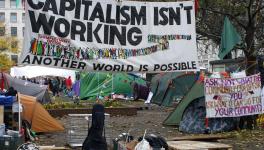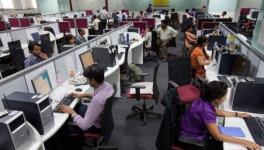Trump, Musk & Neo-Fascist Assault on Working People

Image Courtesy: Flickr
Under late capitalism, there is an assault on the working people that is reminiscent of early capitalism and this assault is worldwide, not just in the Third World but in the advanced capitalist countries as well. This assault is at three levels, economic, political and ideological.
The assault at the economic level has been much talked about, and is the outcome of both higher inflation and greatly enhanced unemployment that currently afflict the capitalist world. The higher inflation was started by a spontaneous increase in profit-margins administered by big capital in the United States in particular, which then spread all over the capitalist world (the mechanism of this spread will not be discussed here but in a later article).
And the enhanced unemployment is the conjoint result both of the world capitalist crisis, and of official attempts to curb inflation everywhere at the expense of the working class by deliberately cutting back on employment. The official hope is that the workers’ bargaining strength gets sufficiently lowered by having greater unemployment so that they cannot bargain for higher money wages to compensate for the price rise, because of which inflation would eventually peter out.
Capitalism in the early years of the Industrial Revolution in Britain, as historians like Eric Hobsbawm have pointed out, was characterised by a rise in poverty. Likewise, late capitalism is also witnessing today an increase in the level of absolute deprivation for the working people.
Economist Joseph Stiglitz had argued that the average real wage of a male American worker in 2011 was slightly lower than in 1968; with the current inflation the real wages today would be even lower than in 2011, and hence also compared with 1968. When we add to it the greater unemployment today in the US compared with 1968 (the official unemployment rate camouflages this fact since it does not take account of the reduced worker-participation rate owing to the “discouraged worker effect” operating in a period of high unemployment), there can be little doubt about the increased impoverishment among American workers.
Much the same can be said of workers in other advanced capitalist countries. For countries, such as India and the rest of the Third World, there is clear evidence of a decline in the nutritional level of the population, as measured by the declining per capita absorption of foodgrains (taking the sum of the grain directly consumed, used as feed for animal products, and processed into food products) in the period since the 1980s.
From this, one can infer an unambiguous increase in the absolute level of poverty among the working people. It follows, therefore, that the economic assault on the working people in the capitalist world, above all the working poor, can scarcely be doubted.
Such an economic assault, however, is impossible to sustain without curbing the political rights of the working people; that is, without a simultaneous political assault on them. And this political assault has taken the form of neo-fascism that has emerged in a big way all over the capitalist world. Neo-fascist leaders head regimes in many countries now, from Javier Milei in Argentina, to Giorgia Meloni in Italy, to Donald Trump in the US, to Narendra Modi in India, to Viktor Orban in Hungary, to Recep Tayyip Erdogan in Turkey, not to mention Benjamin Netanyahu in Israel, though he is in a category of his own.
And in many other countries, neo-fascist formations are waiting in the wings to take power, such as the AfD in Germany and Marine Le Pen’s party in France (in the latter case thwarted till now by a United Left).
The political assault on the working people unleashed by these neo-fascist formations combine outright repression of workers and trade unionists, and a statutory abridgement of workers’ rights, with a change in discourse by “othering” a hapless minority and creating hatred against it among the majority.
Such a change in discourse not only pushes issues of everyday material life of working people to the background, but it also divides them along religious or ethnic lines (along which the “othering” has been done), so that they are not able to mount a united resistance against the economic deprivation which has been inflicted upon them.
What is becoming particularly striking now, however, quite apart from this economic and political assault on the working people, is the ideological assault. This, too, is not confined to occasional odd comments made by this or that person. Such anti-working people comments are being made all over the world, which suggests the rise of a conjuncture of ideological assault on the working people.
In India, in the face of this economic deprivation, various political formations, attempting to acquire political power within an economic regime incapable of producing larger employment, have been offering transfers of benefits to the people. These transfers, too small to nullify the economic impoverishment of the working people (else we would not have witnessed the nutritional deprivation mentioned earlier), have nonetheless been attacked by the ruling neo-fascists and by Prime Minister Modi as being “freebies”.
Although the ruling party itself has now been forced by electoral compulsions, to offer such transfers to the people, this attack on transfers has now been taken up by others. The business executive who had recently asked for a 90-hour week for workers (wanting in effect to create an Auschwitz-type ambience within Indian factories), has jumped in, claiming that such transfers, or “freebies”, as he too has chosen to call them, induce people not to work.
And now a Supreme Court judge, too, has joined this chorus, suggesting that transfers prevent people from working since they can just sit at home, do nothing and still collect their “freebie”. Had the Supreme Court judge made it mandatory on the government to provide decent jobs to people in lieu of transfers, then the matter would have been different; but his remarks were made only against transfers, not for providing decent employment.
Of course, such people would argue that jobs are there but they are going abegging; but they provide not only no evidence for such a claim, but also no evidence on the level of wages that are being offered for such jobs which they claim are going abegging.
The International Labour Organisation (ILO) itself has found that in India there is a severe lack of decent employment opportunities. The government’s employment data are seriously flawed because they show women’s unpaid work in family enterprises to be growing, and this growth is counted as growth in employment; but this growth is reflective of a lack of gainful employment elsewhere and hence constitutes what economists generally call “disguised unemployment”.
Exactly the same ideological assault on the working people is occurring in the US as well. Tycoon Elon Musk, who heads the “Department of Government Efficiency” (DOGE), set up by Trump, is likely from his remarks to effect cuts in Medicaid, Medicare and Social Security benefits for the poor, an apprehension expressed by Senator Bernie Sanders recently (MR online, February13). And this attack on transfers to the poor is being carried out, according to Sanders, so that money can be diverted toward granting tax cuts for the rich, among whom are people like Musk himself, Jeff Bezos of Amazon and Mark Zuckerberg of Meta.
This is an ideological offensive with a vengeance, which conforms to the tenets of the so-called “supply-side economics”. John Kenneth Galbraith, the liberal economist, had said that the essence of “supply-side economics” was the proposition that “the rich work better if they are paid more while the poor work better if they are paid less”. This is being propagated now by the likes of Trump and Musk.
There is, however, an irony here. The pursuit of this ideology that seeks to justify taking money away from the poor and giving it to the rich, will only accentuate the capitalist crisis even more. Since the poor consume more out of a dollar that comes to them compared with the rich, such redistribution will only mean a further shrinkage in aggregate consumption demand. And since capitalists’ investment depends on the expected growth of the market that in turn depends upon the actual experience of market growth, simply giving them tax breaks will not increase their investment one iota. The net result will be a reduction in aggregate demand (taking consumption and investment together) which will only worsen the crisis.
John Maynard Keynes in the 1930s, who was a defender of capitalism and was afraid that something like the Bolshevik Revolution might overtake capitalism in the West, had suggested that for saving the capitalist system it was necessary to boost aggregate demand through government effort. What we are witnessing in contemporary capitalism is the very opposite of this, which will no doubt have far-reaching political implications.
Prabhat Patnaik is Professor Emeritus, Centre for Economic Studies and Planning, Jawaharlal Nehru University, New Delhi. The views are personal.
Get the latest reports & analysis with people's perspective on Protests, movements & deep analytical videos, discussions of the current affairs in your Telegram app. Subscribe to NewsClick's Telegram channel & get Real-Time updates on stories, as they get published on our website.























